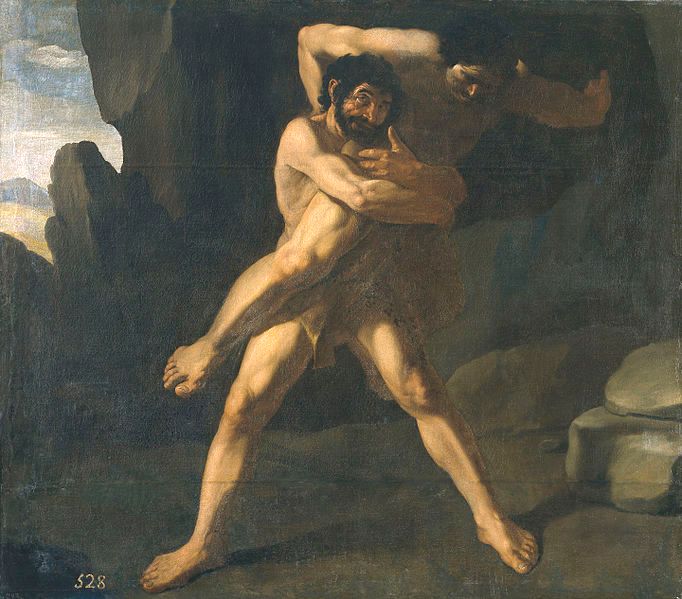ANTAEUS IN GREEK MYTHOLOGY
Antaeus was one of the giants spoken of in Greek mythological tales, and a giant who would be faced by Heracles.
Antaeus Son of Gaia
|
Antaeus was named as a son of Gaia (Earth) and Poseidon.
Antaeus was called a giant, but in the ancient sources no physical description of him was given, and being called a giant in Greek mythology did not necessarily make them gigantic in stature. The Gigantes, for instance, were called giants for their immense strength not necessarily for their height. That being said, many of the sons of Poseidon, were tall, including the Aloadae. |
|
One historical account tells of Antaeus being 60 cubits tall (85 feet), but this comes not from a mythological tale but from the accounts of Quintus Sertorius’ expedition into North Africa. In this account, Sertorius was said to have seen the burial mound of Antaeus, with the dead giant’s bones inside.
Antaeus of Libya
It was said that Antaeus lived in the desert area of Libya. To the Ancient Greeks, Libya was a big area, stretch across North Africa from the Atlantic coastline to the Nile River. Antaeus though, seems to have had links to places in modern day Morocco, including Tangiers and the River Lixos.
Some call Antaeus the protector of Libya, although others see him just as a bandit who preyed on the unwary.
Antaeus was famous for challenging those who passed through Libya to a wrestling bout, a bout in which Antaeus was invariably victorious and where his opponents were left dead. It was also said that Antaeus would use the skulls of those who died in the construction of a temple dedicated to Poseidon.
Some call Antaeus the protector of Libya, although others see him just as a bandit who preyed on the unwary.
Antaeus was famous for challenging those who passed through Libya to a wrestling bout, a bout in which Antaeus was invariably victorious and where his opponents were left dead. It was also said that Antaeus would use the skulls of those who died in the construction of a temple dedicated to Poseidon.
Antaeus and Heracles
|
Whilst travelling to the Garden of the Hesperides to collect the Golden Apples for his eleventh Labour, Heracles would travel through Libya, and of course he would cross paths with Antaeus.
Heracles of course accepted the challenge of a wrestling match laid down by Antaeus, but at the time Heracles did not realise that Antaeus was invincible whilst he touched the earth; for the giant gained his strength from his mother. Thus, every time that Heracles threw, or pinned, Antaeus, the giant came back as strong as before. |
Then the goddess Athena advised Heracles to lift Antaeus aloft, so that he no longer touched the earth. This Heracles did, and with Antaeus’ feet off of the ground, Heracles crushed his ribs, killing him.
Tingis and Iphinoe
|
Later tales, tell of Heracles sleeping with Tinge, the wife of Antaeus, after the Greek hero had killed her husband; Tinge was the eponym of Tingis (Tangier). From this relationship came a son, Sophax, who became protector of Libya after the death of his father, and who was also said to be the ancestor of many of the Berber kings.
Heracles was also said to have slept with Antaeus’ daughter, Iphinoe, and another son of Heracles was born, Palaemon. |
|
Heracles and the Pygmies
Philostratus the Elder also tells of an event after the death of Antaeus, whereby a sleeping Heracles was attacked by an army of Pygmies. The Pygmies claimed kinship to Antaeus, although they were a tribe of incredibly small individuals. Philostratus seems to have exaggerated the supposed smallness of the Pygmies whilst also exaggerating the height of Heracles.
Nevertheless, the army of Pygmies encircled Heracles, but before the attack could begin, Heracles awoke and laughed at his attackers. Heracles swept the Pygmies aside, and gathered some up, placing them in a sack which he carried away.
Nevertheless, the army of Pygmies encircled Heracles, but before the attack could begin, Heracles awoke and laughed at his attackers. Heracles swept the Pygmies aside, and gathered some up, placing them in a sack which he carried away.
|
|
Colin Quartermain - Antaues - 9th October 2021
